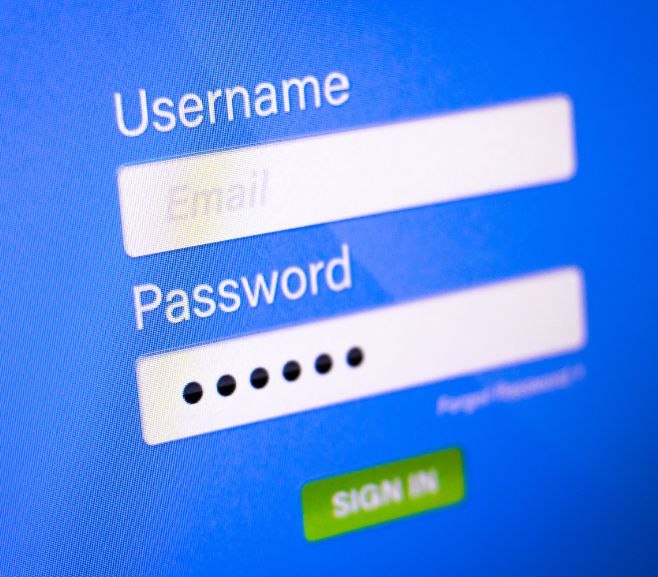In today’s digital age, online security has become more important than ever before. With the rise of cyber attacks, it’s crucial to take steps to protect your online accounts from hackers. In this article, we’ll discuss some of the best practices for securing your online accounts.
1. Use a Strong and Unique Password
First and foremost, it’s essential to use a strong and unique password for each of your online accounts. Avoid using simple and easily guessable passwords such as “123456” or “password.” Instead, use a combination of letters, numbers, and symbols to create a password that is difficult for hackers to crack. You can also use a password manager to generate and store complex passwords for you.
Why Do People Set Easily Guessable Passwords?
Using easily guessable passwords such as “123456” or “password” is a common mistake that many people make when creating online accounts. While it may be convenient to use a simple and easy-to-remember password, doing so can put your online security at risk.

One reason why people use easily guessable passwords is that they believe they will be able to remember them more easily. However, the problem with using simple passwords is that they are also easy for hackers to guess. Hackers often use sophisticated software programs that can quickly guess simple passwords by trying various combinations of common words and numbers.
Another reason why people use simple passwords is that they don’t realize the importance of online security. Many people assume that their online accounts are not valuable or important enough to be targeted by hackers. However, even if you don’t store sensitive information on your accounts, they can still be used to send spam, spread malware, or launch attacks on other users.
Using a combination of letters, numbers, and symbols to create a password is a much more effective way to protect your online accounts. These types of passwords are much harder for hackers to guess, as they involve a more complex combination of characters. Additionally, using a password manager can make it easier to create and remember complex passwords by generating and storing them for you.
Using easily guessable passwords such as “123456” or “password” is a significant risk to your online security. By using a combination of letters, numbers, and symbols to create a strong and unique password for each of your online accounts, you can greatly reduce your risk of falling victim to online attacks. Remember, online security is essential in today’s digital age, and taking the necessary steps to protect your accounts is crucial for keeping your digital life safe.
2. Enable Two-factor Authentication (2FA)
Secondly, enable two-factor authentication (2FA) wherever possible. 2FA adds an extra layer of security to your accounts by requiring a code or token in addition to your password. This code is typically sent to your phone or email, making it much harder for hackers to access your accounts even if they have your password.
What is Two-factor Authentication (2FA) and Its Importance in Security
2FA, or two-factor authentication, is a security measure that provides an extra layer of protection for online accounts. It involves requiring users to provide two forms of identification before they can access their accounts, making it much harder for hackers to gain unauthorized access.

The first factor is typically something you know, such as a password or PIN. The second factor is usually something you have, such as a security token or a mobile device that receives a unique code. This ensures that even if a hacker manages to guess your password or obtain it through a data breach, they won’t be able to access your account without the second factor of authentication.
The importance of 2FA cannot be overstated. Passwords can be easily stolen or hacked, and many people use the same password for multiple accounts. By adding a second factor of authentication, you are significantly reducing the risk of unauthorized access to your accounts, even if your password has been compromised.
2FA is particularly important for accounts that contain sensitive information, such as financial accounts or email accounts. It can also be used to protect social media accounts, online shopping accounts, and any other accounts that could be used to steal your identity or compromise your online security.
In addition to the added security benefits, 2FA is also straightforward to use. Many online services offer 2FA as an option, and it typically only takes a few minutes to set up. Some popular 2FA methods include SMS authentication, mobile app authentication, and physical security keys.
2FA is an essential security measure for protecting your online accounts. By requiring two forms of authentication, it significantly reduces the risk of unauthorized access, even if your password has been compromised. If you haven’t already, consider setting up 2FA for your most important online accounts to help keep your digital life safe and secure.
3. Be Cautious About What You Share Online
Thirdly, be cautious about what you share online. Avoid posting personal information such as your phone number, address, or date of birth on social media or other public forums. Also, be wary of emails or messages that ask for your personal information, as these could be phishing attempts by hackers.
In today’s digital age, it’s easy to share information online without giving it a second thought. However, being careless about what you share can have serious consequences for your online security and privacy.
One of the main risks of sharing too much information online is that it can make you vulnerable to social engineering attacks. Social engineering is a technique used by hackers to gain access to your accounts or sensitive information by tricking you into revealing it. They may use information that you’ve shared online to create a convincing story or impersonate someone you know.
In addition to social engineering, sharing too much information online can also put your physical safety at risk. For example, posting your location or travel plans online can make it easier for someone to track your movements or target you for theft.
To be cautious about what you share online, it’s essential to be mindful of the information you post on social media and other online platforms. Here are a few tips to help you stay safe:
- Think before you post. Before sharing any information online, ask yourself if it’s something you would want the entire world to know. If the answer is no, consider keeping it to yourself.
- Be careful about what you share in public forums. Avoid sharing sensitive information such as your full name, address, phone number, or financial information in public forums or on social media.
- Adjust your privacy settings. Take advantage of privacy settings on social media platforms to control who can see your posts and information.
Being cautious about what you share online is crucial for protecting your online security and privacy. By following these best practices and being mindful of the information you post online, you can greatly reduce your risk of falling victim to cyber-attacks and maintain a safer and more secure online presence.
4. Keep Your Software and Devices up-to-Date
Fourthly, keep your software and devices up-to-date. Hackers often target vulnerabilities in outdated software or operating systems. By keeping your software and devices up-to-date, you can reduce your risk of being targeted by hackers.
Keeping your software and devices up-to-date is one of the most important things you can do to protect your online security. Hackers often target vulnerabilities in outdated software or operating systems, and by keeping your software up-to-date, you can reduce your risk of being targeted by hackers.
Updates to software and devices can include bug fixes, security patches, and new features. These updates are often released by software and device manufacturers in response to identified vulnerabilities or weaknesses that have been discovered in the software or operating system.
By keeping your software and devices up-to-date, you can ensure that you have the latest security patches and bug fixes. These updates can help to address known vulnerabilities and prevent hackers from exploiting them to gain unauthorized access to your device or network.
In addition to keeping your software and devices up-to-date, it’s also important to keep your antivirus software up-to-date. Antivirus software can help protect your computer from viruses, spyware, and other malicious software. However, antivirus software is only effective if it’s up-to-date, as new threats are constantly emerging and evolving.
Updates can also provide new features and functionality. For example, updates to your web browser can improve performance, add new features, and enhance your browsing experience. Keeping your web browser up-to-date is also important for ensuring compatibility with the latest web technologies, which can improve security and privacy.
Finally, updating your software and devices is relatively simple and straightforward. Most devices and software programs have an automatic update feature that can be enabled to download and install updates automatically. You can also manually check for updates on a regular basis to ensure that your software and devices are up-to-date.
Keeping your software and devices up-to-date is a critical component of maintaining good online security. By ensuring that your software is up-to-date, you can reduce your risk of being targeted by hackers and improve the performance and functionality of your devices. Remember to check for updates regularly and enable automatic updates where possible to ensure that your software and devices stay up-to-date and secure.
5. Use a Virtual Private Network (VPN) When Accessing the Internet on Public Wi-Fi Networks
Finally, use a virtual private network (VPN) when accessing the internet on public Wi-Fi networks. Public Wi-Fi networks are often unsecured, making it easy for hackers to intercept your data. By using a VPN, you can encrypt your internet traffic and protect your data from prying eyes.

When you connect to a public Wi-Fi network, such as those found in cafes, airports, and libraries, your data can be easily intercepted by hackers. Public Wi-Fi networks are often unsecured, which means that anyone can access them and potentially gain access to your personal and sensitive information. Using a virtual private network (VPN) is an effective way to protect your data and keep your online activity private.
A VPN creates a secure, encrypted connection between your device and the internet. When you use a VPN, all of your internet traffic is routed through the VPN’s servers, which encrypt your data and protect it from interception. This means that even if someone were to intercept your data, they would not be able to read it.
There are several reasons why using a VPN is important when accessing the internet on public Wi-Fi networks:
- Protects your data: When you use a VPN, your data is encrypted, which means that even if it is intercepted, it will be unreadable to the hacker.
- Keeps your online activity private: Using a VPN can help you keep your online activity private, even when you’re using a public Wi-Fi network. Your internet service provider, as well as anyone monitoring the network, will not be able to see what you’re doing online.
- Allows you to access content that may be restricted: Some websites and services may be restricted in certain regions or countries. By using a VPN, you can access these websites and services as if you were located in a different region.
- Helps you avoid government surveillance: In some countries, the government may monitor internet traffic and restrict access to certain websites and services. By using a VPN, you can avoid government surveillance and access the internet freely.
It’s important to note that not all VPNs are created equal. Some free VPNs may actually be collecting and selling your data, so it’s important to choose a reputable VPN provider that has a strong track record for protecting user privacy.
Using a VPN is an effective way to protect your data and keep your online activity private when using public Wi-Fi networks. By encrypting your internet traffic, you can prevent hackers from intercepting your data and keep your online activity hidden from prying eyes. Just be sure to choose a reputable VPN provider that is committed to protecting user privacy.
Conclusion
To summarize, securing your online accounts is a vital part of keeping your digital life safe. Using strong passwords, enabling 2FA, being cautious about what you share online, keeping your software up-to-date, and using a VPN on public Wi-Fi networks are just a few of the best practices you can implement to protect yourself from cyber attacks.
It’s also essential to stay informed about the latest online security threats and trends. Cybersecurity is constantly evolving, and it’s crucial to stay up-to-date with the latest news and developments to stay one step ahead of hackers.
By following these best practices and staying informed, you can significantly reduce your risk of falling victim to online attacks. With a little bit of effort and diligence, you can keep your online accounts secure and enjoy a safer and more secure digital life.




